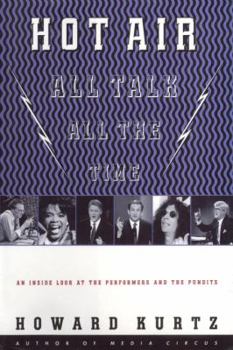Hot Air:: All Talk, All the Time
Select Format
Select Condition 
Book Overview
America is awash in talk. Loud talk, angry talk, conspiratorial talk that has changed the nature of journalism and politics, producing a high-decibel revolution in the way we communicate. In this... This description may be from another edition of this product.
Format:Hardcover
Language:English
ISBN:0812926242
ISBN13:9780812926248
Release Date:January 1996
Publisher:Crown Publishing Group (NY)
Length:407 Pages
Weight:1.55 lbs.
Dimensions:1.3" x 6.4" x 9.5"
Customer Reviews
2 ratings
Loved the book - front to back
Published by Thriftbooks.com User , 24 years ago
Howard Kurtz is an insider. He knows about that which he speaks. As a result this book offered wonderful insight into the program format of "talk." Although I can't put my finger on exactly why, it seems that the talk format got a lot of attention in the early 1990s. Perhaps it was because Rush Limbaugh was getting so much attention after the '94 elections; or that James Carville was single-handedly dumbing down the political talk show circuit? In any case, Kurtz go this book out in 1996 right at the tail end of the whole deal. The stories are classic Kurtz and as such are quite entertaining, but take 'em with a grain of salt. I based my masters thesis on a premise in another Kurtz book (Spin Cycle) only to discover that a quantitative analysis proved the premise slightly off-mark. In other words, when Kurtz says that Imus was responsible (or "helpful") for getting Bill Clinton elected, it's a good idea to pause and take note of all the factors involved. The genre is certainly fascinating fare, but Kurtz often wants us to believe that talk show hosts are the real agenda-setters in our society. The fact is that mass society theory (aka: magic bullet or hypodermic needle approaches) has largely been discounted. We know that the influence of these shows can be great in certain instances, but by and large their influence is best described as moderate. If you want to push the case that people who watch Jerry Springer everyday are prone to behavioral disorders, I would recommend reading several research articles by George Gerbner (or Bandura & Ross) and then rejoining the discussion. In fact, the whole book is a budding communication researcher's dream. There are so many passages that are screaming to be tested. And in other passages, certain communication theories may go unmentioned, but are clearly being described. For example: In chapter three, Kurtz cites a producer for Sally Jesse who said that these daytime TV shows are really just giving the people what they want. This is the old debate as to whether TV is dumbing down society's level of conversation. In chapter eleven, he quotes a Clinton aide talking about "the water cooler effect." There are many other (and perhaps better) instances in the book where this is the case.I enjoyed the book. It's a good read. I only wish that Kurtz would write a newer revised edition; my guess is that the air has grown a little more "stale" than "hot" in the past few years. And that may be why no update is on the agenda.
Outstanding Analysis of Today's Media Culture
Published by Thriftbooks.com User , 26 years ago
Howard Kurtz gives the best analysis I've seen of today's talk show circus. His best point is that "television is the enemy of complexity." Tons of details are available on virtually every major talk show host/hostess and regular participants, both in radio and television. I like this book much more than I expected, and encourage anyone who likes "talking head" shows to give it a look.





